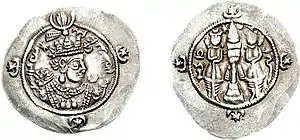628
Year 628 (DCXXVIII) was a leap year starting on Friday (link will display the full calendar) of the Julian calendar. The denomination 628 for this year has been used since the early medieval period, when the Anno Domini calendar era became the prevalent method in Europe for naming years.
| Millennium: | 1st millennium |
|---|---|
| Centuries: | |
| Decades: | |
| Years: |
| 628 by topic |
|---|
| Leaders |
|
| Categories |
|
| Gregorian calendar | 628 DCXXVIII |
| Ab urbe condita | 1381 |
| Armenian calendar | 77 ԹՎ ՀԷ |
| Assyrian calendar | 5378 |
| Balinese saka calendar | 549–550 |
| Bengali calendar | 35 |
| Berber calendar | 1578 |
| Buddhist calendar | 1172 |
| Burmese calendar | −10 |
| Byzantine calendar | 6136–6137 |
| Chinese calendar | 丁亥年 (Fire Pig) 3324 or 3264 — to — 戊子年 (Earth Rat) 3325 or 3265 |
| Coptic calendar | 344–345 |
| Discordian calendar | 1794 |
| Ethiopian calendar | 620–621 |
| Hebrew calendar | 4388–4389 |
| Hindu calendars | |
| - Vikram Samvat | 684–685 |
| - Shaka Samvat | 549–550 |
| - Kali Yuga | 3728–3729 |
| Holocene calendar | 10628 |
| Iranian calendar | 6–7 |
| Islamic calendar | 6–7 |
| Japanese calendar | N/A |
| Javanese calendar | 518–519 |
| Julian calendar | 628 DCXXVIII |
| Korean calendar | 2961 |
| Minguo calendar | 1284 before ROC 民前1284年 |
| Nanakshahi calendar | −840 |
| Seleucid era | 939/940 AG |
| Thai solar calendar | 1170–1171 |
| Tibetan calendar | 阴火猪年 (female Fire-Pig) 754 or 373 or −399 — to — 阳土鼠年 (male Earth-Rat) 755 or 374 or −398 |

Coin of king Ardashir III (c. 621–630)
Events
Byzantine Empire
- Spring – Byzantine–Sassanid War: Emperor Heraclius issues an ultimatum for peace to King Khosrow II, but he refuses his generous terms. The war-weary Persians revolt against Khosrow's regime at Ctesiphon, and install his son Kavadh II on the throne on February 25. He puts his father to death and begins negotiations with Heraclius. Kavadh is forced to return all the territories conquered during the war. The Persians must give up all of the trophies they have captured, including the relic of the True Cross. Evidently there is also a large financial indemnity. Having accepted a peace agreement on his own terms, Heraclius returns in triumph to Constantinople.[1]
- Third Perso-Turkic War: The Western Göktürks, under their leader Tong Yabghu Qaghan, plunder Tbilisi (modern Georgia). The Persian defenders are executed or mutilated; Tong Yabghu appoints governors (tuduns) to manage various tribes under his overlordship.[2]
Britain
- Battle of Cirencester: King Penda of Mercia defeats the West Saxons at Cirencester (southwest England), in what later will be Gloucestershire. After reaching an agreement, he takes control of the Severn Valley and the minor kingdom of the Hwicce.[3][4]
Central America
- February 5 – K'ak' Chan Yopaat, who had been the ruler of the Mayan city state of Copán in Honduras, dies after a 49 year reign that began in 578.
- February 21 – Chan Imix K'awiil, becomes the new ruler of the Mayan city state of Copán in Honduras, and rules until his death 67 years later in 695.
Persia
- February 25 – Khosrow II, the last great shah of the Sasanian Empire, is overthrown by his son Kavad II.
- September 6 – Ardashir III, age 7, succeeds his father Kavad II as the twenty-fourth shah of the Sasanian Empire on the latter's death from the plague that is devastating western Persia.
Arabia
- Muhammad, Islamic prophet, leads about 1,400 men on a pilgrimage to Mecca, where their passage is blocked. The Quraysh tribe and the Muslim community in Medina sign a 10-year truce (Treaty of Hudaybiyyah).
Arts and sciences
- Indian astronomer Brahmagupta writes the Brāhmasphuṭasiddhānta, an early, yet very advanced, mathematics book, including rules for computing with zero.
Education
Religion
- Muhammad's letters to world leaders explain the principles of the new monotheistic Muslim faith, as they will be contained in the Quran.
- Marutha of Tikrit is consecrated Maphrian of the East in the Syriac Orthodox Church.
Births
Deaths
- January 22 – Anastasius of Persia, monk
- February 28 – Khosrow II, king of the Persian Empire
- April 15 – Empress Suiko of Japan
- June 3 – Liang Shidu, rebel leader
- Babai the Great, church father and theologian
- Du Yan, chancellor of the Tang dynasty
- Kavadh II, king of the Sasanian Empire
- Li Dashi, Chinese official and historian (b. 570)
- Shirin, wife of Khosrow II (approximate date)
- Suibne Menn, High King of Ireland
- Theodelinda, queen of the Lombards
- Tong Yabghu Qaghan, ruler of the Göktürks
References
- Kaegi 2003, pp. 178, 189–190.
- Christian 1999, p. 283; Artamanov, p. 170–180.
- The Anglo-Saxon Chronicle
- Palmer, Alan & Veronica (1992). The Chronology of British History. London: Century Ltd. pp. 30–34. ISBN 0-7126-5616-2.
Sources
- Christian, David (1999). A History of Russia, Mongolia and Central Asia. Malden, MA: Blackwell. ISBN 978-0-631-20814-3.
- Kaegi, Walter E. (2003). Heraclius: emperor of Byzantium. Cambridge University Press. ISBN 0-521-81459-6.
This article is issued from Wikipedia. The text is licensed under Creative Commons - Attribution - Sharealike. Additional terms may apply for the media files.